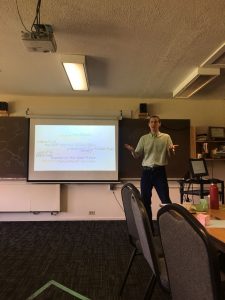When the teacher becomes a student in their own classroom
October 8th, 2018 | SIT Graduate Institute

By Matthew Champlin
Anyone who has taught in a classroom can grasp the significance of having an expert observe their classes. Any teacher seeking to grow in the art and science of teaching can also imagine how beneficial it would be to have an experienced teacher giving them constructive input on how to maximize their effectiveness in their context and within their own personal style.
SIT’s low-residency MA in TESOL provides exactly that. This degree has been the perfect blend of learning contexts for me. I do a lot of my coursework online every week, but I have also been on campus in Vermont with my cohort members for a total of six weeks over two summers.
When one is working abroad and tells someone that they are doing a master’s degree in TESOL, the first question tends to be skeptical. “Is it online?”
When my answer is, “Kinda,” it typically doesn’t impress people much. But when I go on to describe how one of my professors came to Istanbul, observed me in all of my classes for several days, and offered me guidance on growth points for both my teaching style and my actual classroom setting, my listener is often blown away.

When I was choosing a TESOL program, this is the phrase that leapt off SIT’s website at me: “a supervised observation in your classroom by an SIT faculty member.” When I determined that this program was also more affordable than many other options, I called the school and asked directly whether the program truly included on-site observation anywhere in the world. When the answer was yes, I signed up.
Over the past 15 months, I haven’t been disappointed with any aspect of this MA program. Since February, I have particularly valued the benefits I have seen from the on-site supervision. Because this visit is not an evaluation, its value is tremendously enriched. Suddenly, my program is collaborative not only in theory but also in practice. My supervisor and I have been able to discuss my daily realities and problem-solve for my students with unique clarity and specificity, connecting my TESOL classes to my daily teaching. She also helped me learn more about my own identity as a teacher, including offering guidance on how I can maintain long-term professional health and growth.
Because the observation period covers multiple days, the supervisor has provided relational, contextually relevant input for strategic effectiveness within my individualized setting. I cannot overstate the value of this visit and the collaborative results that it brings.
